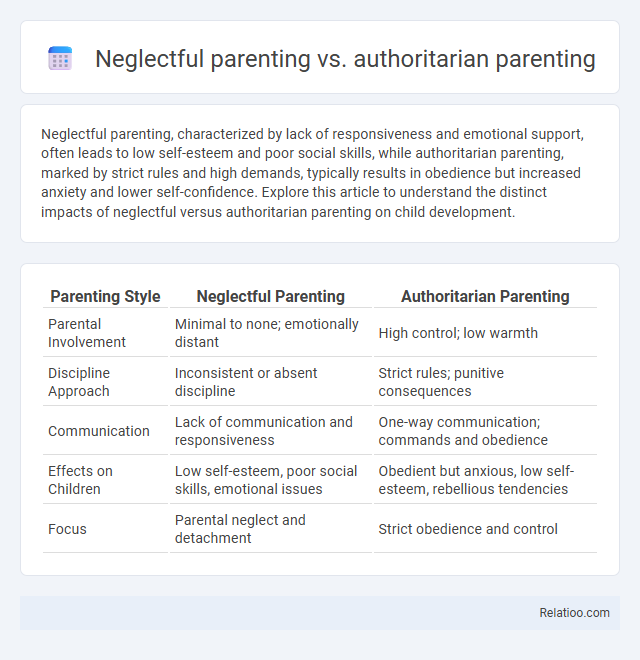Neglectful parenting, characterized by lack of responsiveness and emotional support, often leads to low self-esteem and poor social skills, while authoritarian parenting, marked by strict rules and high demands, typically results in obedience but increased anxiety and lower self-confidence. Explore this article to understand the distinct impacts of neglectful versus authoritarian parenting on child development.
Table of Comparison
| Parenting Style | Neglectful Parenting | Authoritarian Parenting |
|---|---|---|
| Parental Involvement | Minimal to none; emotionally distant | High control; low warmth |
| Discipline Approach | Inconsistent or absent discipline | Strict rules; punitive consequences |
| Communication | Lack of communication and responsiveness | One-way communication; commands and obedience |
| Effects on Children | Low self-esteem, poor social skills, emotional issues | Obedient but anxious, low self-esteem, rebellious tendencies |
| Focus | Parental neglect and detachment | Strict obedience and control |
Understanding Parenting Styles: An Overview
Neglectful parenting, characterized by a lack of responsiveness and minimal involvement, contrasts sharply with authoritarian parenting, which demands strict obedience and enforces high expectations with little warmth. Understanding your parenting style impacts your child's emotional development and behavioral outcomes, as neglectful parents risk fostering feelings of insecurity, while authoritarian approaches may lead to compliance but hinder social skills. Recognizing these differences enables you to adopt more balanced and effective strategies to support your child's growth.
What Is Neglectful Parenting?
Neglectful parenting is characterized by a lack of responsiveness to a child's needs, often resulting in emotional detachment and minimal involvement in the child's life. Unlike authoritarian parenting, which imposes strict rules and high demands, neglectful parents provide neither guidance nor support, leading to potential developmental challenges and low self-esteem in children. Understanding the impact of neglectful parenting can help you recognize the importance of active engagement in your child's emotional and physical well-being.
Characteristics of Authoritarian Parenting
Authoritarian parenting is characterized by high demands and strict rules with little warmth or responsiveness, emphasizing obedience and discipline over open communication. Parents who adopt this style often enforce rigid expectations, use punishment to control behavior, and provide limited emotional support or nurturing. This approach can lead to children who are obedient but may struggle with self-esteem, social skills, and emotional regulation.
Emotional Effects on Children
Neglectful parenting often leads to children experiencing feelings of abandonment, low self-esteem, and difficulty forming secure attachments, as their emotional needs are consistently unmet. Authoritarian parenting can cause children to develop anxiety, fear of failure, and suppressed emotional expression due to strict rules and harsh discipline. Understanding these emotional effects on children helps you foster a more supportive environment that promotes their psychological well-being and resilience.
Academic Outcomes and Motivation
Neglectful parenting is strongly associated with poor academic outcomes and low intrinsic motivation due to a lack of parental support and guidance, resulting in disengaged and underachieving students. Authoritarian parenting, characterized by rigid rules and high demands, often leads to moderate academic performance but diminished intrinsic motivation, as children may comply out of fear rather than genuine interest. Neglectful parent-child relationships significantly hinder cognitive development and self-regulation skills, which are critical for academic success and sustained motivation.
Social Skills and Peer Relationships
Neglectful parenting often results in children exhibiting poor social skills and difficulty forming healthy peer relationships due to lack of emotional support and guidance. Authoritarian parenting may lead to children having limited social competence and peer interaction issues, as strict rules and low warmth hinder open communication and emotional expression. Neglectful parenting consistently correlates with increased social anxiety and peer rejection, highlighting the critical impact of parental involvement on social development.
Long-Term Consequences into Adulthood
Neglectful parenting often leads to long-term consequences such as low self-esteem, difficulty forming healthy relationships, and increased risk of mental health disorders like depression and anxiety due to emotional deprivation. Authoritarian parenting may result in adults who struggle with authority, exhibit lower social competence, and experience higher levels of stress and anxiety stemming from rigid control and lack of autonomy during childhood. Both styles contribute to challenges in emotional regulation and self-identity, but neglectful parenting is uniquely associated with feelings of abandonment and impaired social development into adulthood.
Cultural Influences on Parenting Styles
Cultural influences shape the distinctions between neglectful, authoritarian, and permissive parenting styles by dictating norms surrounding authority, emotional expression, and child independence. Your understanding of these styles must consider how collectivist cultures often emphasize authoritarian practices to maintain family cohesion, whereas individualistic societies may lean toward permissive or neglectful approaches due to valuing autonomy. Research shows that cultural values impact discipline methods and emotional support, influencing long-term child development outcomes.
Recognizing Signs and Seeking Help
Recognizing signs of neglectful parenting includes consistent lack of supervision, emotional unavailability, and failure to meet basic needs, while authoritarian parenting is marked by strict rules, high demands, and limited emotional warmth. Identifying these behaviors early is crucial for intervention, as neglect impacts child development significantly and authoritarian style can lead to anxiety or low self-esteem. Seeking help from child psychologists, social workers, or family counselors facilitates support, offering strategies to improve parenting practices and promote healthy child growth.
Promoting Healthy Parent-Child Relationships
Promoting healthy parent-child relationships requires understanding the distinct impacts of neglectful parenting, authoritarian parenting, and neglectful behaviors on your child's emotional development. Authoritarian parenting often prioritizes strict discipline and control, which can hinder emotional expression, while neglectful parenting is characterized by a lack of responsiveness and involvement, leading to feelings of insecurity and low self-esteem. Fostering open communication, consistent support, and emotional availability are essential for building a strong, trusting bond that supports your child's overall well-being.

Infographic: Neglectful parenting vs Authoritarian parenting
 relatioo.com
relatioo.com